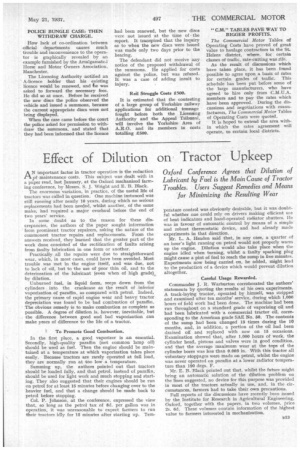Effect of Dilution on Tractor Upkeep
Page 47

If you've noticed an error in this article please click here to report it so we can fix it.
ANimportant factor in tractor operation is the reduction pf maintenance costs. This subject was dealt with in a paper read, last January, at the Oxford mechanized farming conference, by Messrs. S. J. Wright and E. B. Black.
The enormous variation, in practice, of the useful life of tractors was called in question. One machine instanced was still running after nearly 10 years, during which no serious replacements had been needed, whilst another, of the same make, had required a major overhaul before the end of two years' service.
In some doubt as to the reason for these discrepancies, the authors of the paper sought information from prominent tractor repairers, asking the nature of the commonest tractor repairs and replacements. From the answers received, they learned that the greater part of the work done consisted of the rectification of faults arising from faulty lubrication in one form or another.
Practically all the repairs were due to straightforward wear, which, in most cases, could have been avoided. Most trouble was met in the engine itself, and was due, not to lack of oil, but to the use of poor thin oil, and to the deterioration .af the lubricant (even when of high grade), by dilution.
Unburned fuel, in liquid form, seeps down from the cylinders into the crankcase as the result of inferior vaporization of paraffin, as compared with petrol. Indeed, the primary cause of rapid engine wear and heavy tractor depreciation was found to be bad combustion of paraffin The obvious remedy is to make combustion as complete as possible. A degree of dilution is, however, inevitable, but the difference between good and bad vaporization can make years of difference to thc life of a tractor.
To Promote Good Combustion.
In the first place, a good vaporizer is ,an essential. Secondly, high-quality paraffin (not common lamp oil) should be used as fuel. Then the engine should be maintained at a temperature at which vaporization takes place easily. Because tractors are rarely operated at full load, they are normally run at too low a temperature.
Summing up, the authors pointed out that tractors should be loaded fully, and that petrol, instead of paraffin, should be used for light work and much stopping and starting. They also suggested that their engines should be run on petrol for at least 15 minutes before changing over to the heavier fuel, and that a change should be made back to petrol before stopping.
Col. P. Johnson, at the conference, expressed the view that, so long as the petrol tax of 8d. per gallon was in operation, it was unreasonable to expect farmers to run their tractors idly for 15 minutes after starting up. Tern perature control was obviously desirable, but it was doubtful whether one could rely on drivers making efficient use of heat indicators and hand-operated radiator shutters. He was in favour of automatic control by means of a simple and robust thermostatic device, and had already made experiments in that direction. Mr. L. A. Headen said that, in any case, a quarter of an hour's light running on petrol would not properly warm up the engine. Dilution would also take place when the engine idled when turning, whilst a faulty sparking plug might cause a pint of fuel to reach the sump in five minutes. Experiments now being carried on, he added, might lead to the production of a device which would prevent dilution altogether.
Careful Usage Rewarded.
Commander J. R. Warburton corroborated the authors' statements by quoting the results of his own experiments. A track-laying tractor, operated by himself, was stripped and examined after ten months' service, during which 1,000 hours of field work had been done. The machine had been run throughout on a standard grade of vaporizing oil and bad been lubricated with a commercial tractor oil, corresponding to the American grade SAE No. 50. The contents of the sump had been changed 13 times during the 10 months, and, in addition, a portion of the oil had been drained off and replaced with new on 15 occasions. Examination showed that, after 1,000 hours of work, the cylinder head, pistons and valves were in good condition, and that the average maximum wear at the tops of the cylinder bores was less than 0.003 in. With this tractor all voluntary stoppages were made on petrol, whilst the engine was never operated on paraffin at a lower radiator temperature than 190 degs. F.
Mr. E. B. Black pointed out that, whilst the future might bring an automatic solution of the dilution problem on the lines suggested, no device for this purpose was provided in most of the tractors actually in use, and, in the circumstances, farmers had to take their own precautions.
Full reports of the discussions have recently been issued by the Institute for Research in Agricultural Engineering, Oxford, together with the papers, in two volumes, price 2s. 6d. These volumes contain information of the highest value to farmers interested in mechanization.




































































































